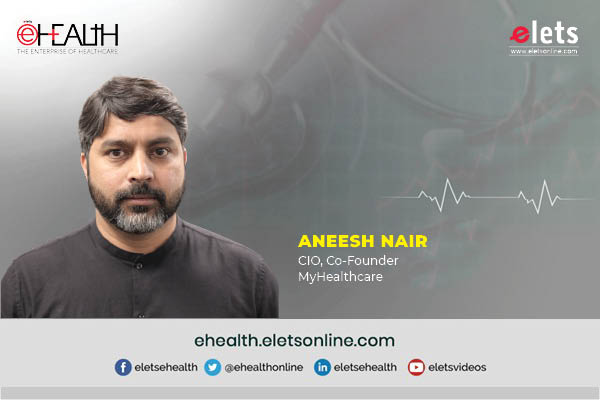
Artificial intelligence (AI) has altered industries around the world and has the prospect of radically altering the domain of healthcare. There has been a rapid growth of the internet and improvements in cloud technology during COVID-19 which has significantly changed the healthcare sector. Shedding light on this Aneesh Nair, CIO, Co-Founder of MyHealthcare interacted with Kaanchi Chawla of Elets News Network (ENN). Edited excerpts:
Which are the healthcare segments that are witnessing augmented use of AI in delivering efficient healthcare?

With the aggressive push for digitalisation in healthcare and looking at the shortage of doctors, nurses, and healthcare providers, the use of AI and automation has become a key driver in being able to deliver quality healthcare, at scale.
Leveraging AI, patients are able to use platforms such as symptom checkers to find the appropriate next steps and help in the selection of the right specialist. The AI symptom analyser is able to guide the patient on whether they need to head to the hospital or use virtual consultation platforms to connect with a doctor. AI tools can also help in guiding the patient through the care continuum process such as diagnostics tests, home care services such as nursing, care provider, physiotherapy at home, and assist with pharmacy delivery.
Clinical medical device companies have started using AI in analysing the data generated and providing clinical markers to help doctors diagnose more effectively. Combining information from multiple, clinical vitals monitoring devices, healthcare ecosystems are able to offer meaningful remote patient monitoring information to doctors and specialists, in managing their patient’s care effectively, without having to travel to hospitals or clinics. AI tools help in bridging the limitations telemedicine has been facing in being able to get the required patient information, vitals data, and patient longitudinal history to clinicians. AI has been able to offer the most efficient and cost-effective, scalable care platform for patients.

How has AI transformed healthcare delivery? What are some of the notable use cases that you recall?
The application of AI has proven to improve many processes within healthcare operations and delivery, including handling medical records, real-time transmission and analysis of clinical data, m-consultations, and preventive healthcare. With the help of AI, healthcare practitioners can improve their experiences by enabling them to spend more time in direct patient care and reducing burnout.
Recently, MyHealthcare launched its MyHealthcare Enterprise Application (MHEA) for hospitals and healthcare institutions, taking another important step towards the digitisation and digitalisation of healthcare in India. The MHEA ecosystem is designed on a robust, highly configurable, workflow engine that enables clinicians and hospital teams to manage complete patient care and hospital operations, through a task-based healthcare information management system. The ecosystem has been architected to drive operational & process efficiencies across the provider network, helping with the complete digitisation of the clinical, administrative, and procurement processes.
The growing digital footprint and technology trends have enhanced healthcare systems, but there still lies the need for a human workforce. Where are the gaps in curating healthcare data?
India is building an entrepreneurship model with accelerated innovation for the rest of the world. Indian startups are disrupting the industry by seizing opportunities, changing the status quo, and innovating across sectors. Startups will continue to lead the way in innovation with AI, IoT, and data analytics, especially with data becoming the central currency of the healthcare industry. Digitisation will increase among healthcare technology providers, including health-tech startups considering the adoption of government-led initiatives such as the Ayushman Bharat Digital Mission (ABDM).
As technological advancements continue on a rapid basis, healthcare providers move towards more digital care options to enhance their treatment and patient experience. Your thoughts.
There has been a rapid growth of the internet and improvements in cloud technology during COVID-19 which has significantly changed the healthcare sector.
Platforms like MyHealthcare are focused on leveraging the potential of a digital healthcare ecosystem to bridge care delivery gaps using data driven care processes that make healthcare accessible across the country. With the help of AI, internet penetration, digital technology, and cloud technology, we are able to increase the accessibility of quality healthcare and make it more efficient. With the help of such ecosystems, there has been a huge fundamental transformation of the relationships with its consumers. Digital healthcare has immensely helped healthcare providers streamline operations, understand what the patient requires, build loyalty and trust and offer a better user experience.
AI-enabled robots can be a big boon in healthcare. How do you think it is helping doctors in their day-to-day life?
In today’s time, AI has simplified the life of patients, doctors, and hospitals by performing tasks that are typically done by humans but in less time and at less cost. AI puts consumers in control of their health and well-being. Additionally, AI increases the ability of healthcare professionals to better understand the day-to-day patterns and needs of the people they care for, and with that understanding, they are able to provide better feedback, guidance, and support for staying healthy. With the help of AI, the diagnosis for doctors becomes easy at an early stage itself. AI can provide the test results of MRI, CT Scans, ultrasound, etc, which reduces the time taken to conduct the test and gives out the results quickly. This saves the patients from waiting for weeks to get a test result as they can get it within hours. AI has a lot of scope in healthcare services in the coming years. The hybrid models will help doctors in the diagnosis of patients, identifying diseases, etc.
Be a part of Elets Collaborative Initiatives. Join Us for Upcoming Events and explore business opportunities. Like us on Facebook , connect with us on LinkedIn and follow us on Twitter , Instagram.












